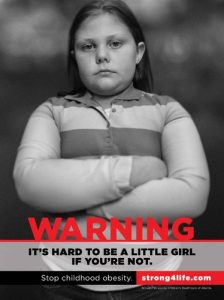
The advertisement I will be deconstructing for my culture jam was released by Strong4Life, a company based out of Atlanta, with the aim to help parents raise ‘healthy’ kids. The advertisement depicts a sad young fat girl standing with her arms crossed with the caption “Warning: It’s hard to be a little girl if you’re not. Stop childhood obesity.” The ad is intended to be blunt and shock the viewer into taking action to improve their health, however, in actuality, it demonizes fat female bodies and creates a binary between health and fatness.
The advertisement takes the girl’s humanity and implies that because she is fat, she is no longer a little girl; her fatness defines her as a monstrous being no longer deserving of the same care and respect that other, thin, children are provided. She is thus presented as a warning sign of what fatness entails for women: dehumanization. Despite being perceived as a movement to improve the health of women and children, fat shaming is used by patriarchal society as a form of gendered domination to vilify fat female bodies as complicit in their own degradation. Fat female bodies are held responsible for their fatness and the harassment which accompanies this position. Fat women take up more physical space, are seen as bothersome, and are viewed as undesirable to look at; they are the physical embodiment of everything the patriarchy hates. In patriarchy, women are reduced to sexual beings, objects of pleasure, and are constantly told what to do with their bodies. Patriarchal control of female bodies works to diminish bodily autonomy and serve as an instrument for the continued persecution of women. Body shaming works to shape Western women to please men. By framing childhood obesity as a societal health problem and openly persecuting fat women, the advertisement advocates the harassment of fat women and children. It makes no genuine effort to tackle the health issues it claims but instead resorts to fat shaming.
In short, this advertisement reinscribes notions of health and wellness equating thinness and upholds the gendered domination of patriarchal society.
Original Image Address: https://www.npr.org/2012/01/09/144799538/controversy-swirls-around-harsh-anti-obesity-ads
